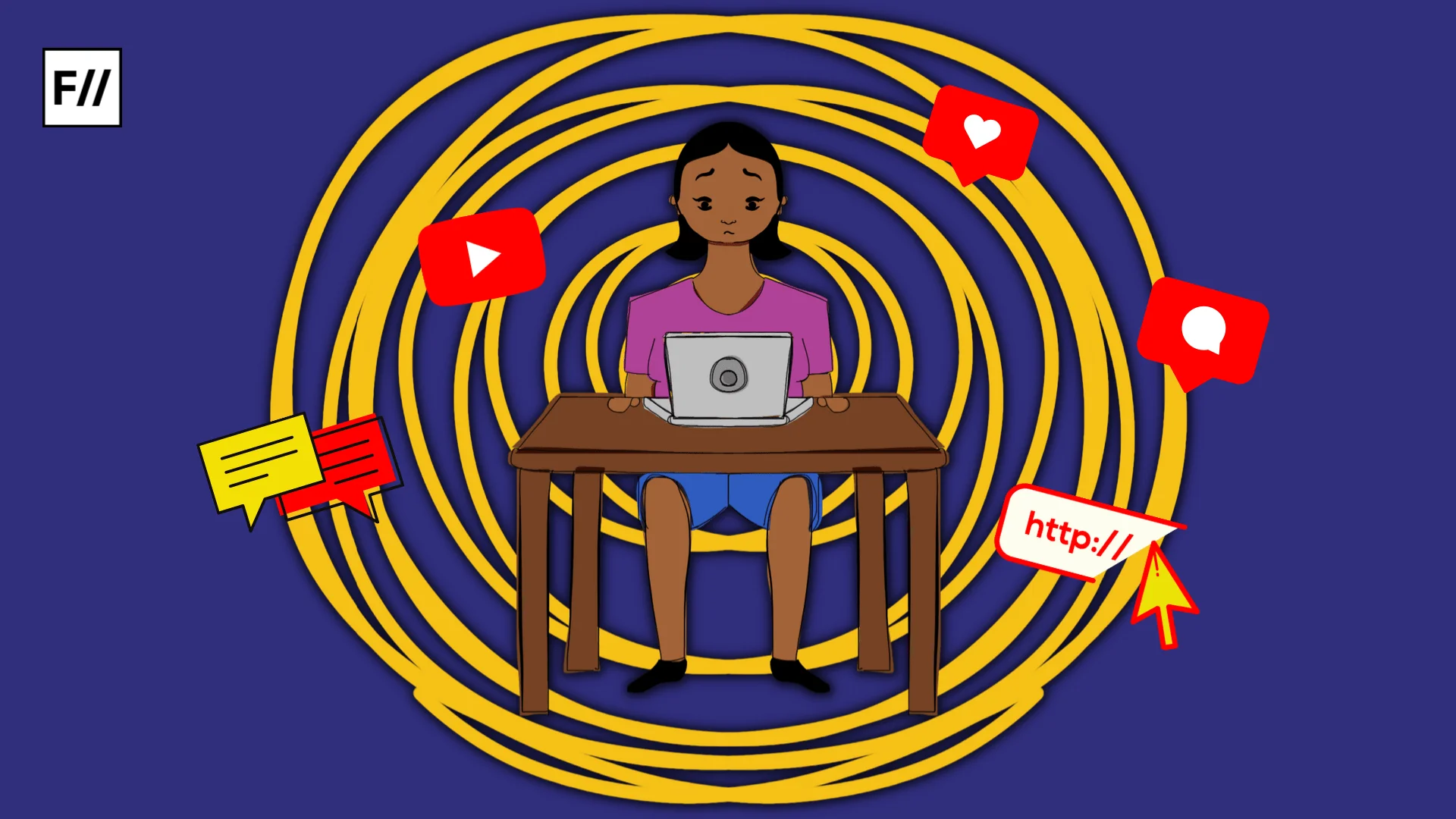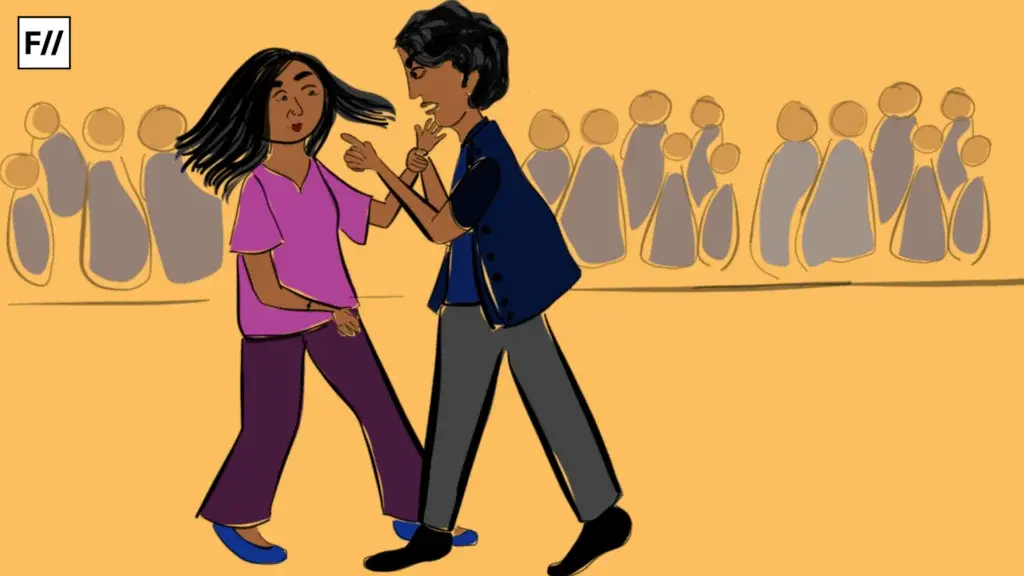Offence and outrage are quotidian features in India. Everything offends, and nothing offends as much as comedy. The laundry list of comedians and internet personalities that threaten ‘Indian culture’ grows by leaps and bounds each day. Trolling, threats, and FIRs are a standard occurrence in an increasingly intolerant country, where freedom of speech can only be enjoyed so far as cultural and ideological whims allow for it.
However, while offence is a staple, one critical feature is often overlooked in the discourse surrounding it: its deeply gendered manifestations and how offence and misogyny’s confluence has led to the normalisation of the relentless harassment of women in online spaces.
Apoorva Mukhija, popularly known by her internet alter ego, The Rebel Kid, recently released a video detailing the harassment and threats she has been subjected to since her appearance on the controversial episode of the show, India’s Got Latent. In a 34-minute video, she discussed how she has received numerous death and rape threats since the show aired, with some threatening messages even containing mentions of her home address.
Mukhija was a panellist on an episode of the show, which was taken off air following outrage and legal action over some remarks made in the episode. Online outrage over comments made by YouTuber Ranveer Allahabadia, another panellist on the episode, soon gave way to police action, with FIRs being filed against over thirty individuals associated with the show. The investigation into the show is still ongoing, however, Mukhija has since been subjected to incessant harassment and threats.
Toeing the line of gendered patriarchal propriety: The case of Apoorva Mukhija
While Mukhija has borne the brunt of the trolling and harassment, her offending comment wasn’t an unprompted statement at all and was a response to a sexist and inappropriate sexual remark directed at her by one of the contestants. While public anger over Mukhija’s language has been growing and the grandstanding and handwringing over cultural decline has been at a fever pitch, the inappropriate comment Mukhija was responding to has received little to no attention or even mention.
However, the anger directed at Mukhija goes beyond mere outrage over her comments on the show; she’s being disproportionately and horrifically targeted because of her previous content, which often discussed sex, sexuality, and relationships. This isn’t run-of-the-mill outrage regarding ‘respecting the culture’ that all panellists were subjected to after the show; it’s aimed at keeping in check a woman who has transgressed the regressive patriarchal norms of appropriate feminine behaviour.
The answer to the horrific nature and scale of her harassment can be found in her previous content and the patriarchal scorn it’s bound to elicit. Mukhija’s content and online persona don’t align with patriarchal diktats of what constitutes appropriate behaviour and ways of being for women in patriarchal societies.
Her content discussing sex, relationships, using coarse language, and containing glimpses of partying is viewed as a threat because it is a product of her exercising her autonomy and agency and a rejection of the narrow patriarchal confines our culture expects women to be within. Patriarchal frameworks actively seek to strip women of their autonomy and agency to keep them relegated and bound to gendered roles and expectations in order to maintain the patriarchal order wherein they remain subservient to men by externalising their autonomy to them.
Patriarchal frameworks actively seek to strip women of their autonomy and agency to keep them relegated and bound to gendered roles and expectations in order to maintain the patriarchal order wherein they remain subservient to men by externalising their autonomy to them.
Even Mukhija’s internet nom de guerre, The Rebel Kid, embodies this rejection of these ideals imposed on women and even explains the ire her content has always drawn.
Ideas of feminine respectability and properness are integral to the patriarchy, as they are essential tools for exerting control over women. These ideals are enforced upon women through a variety of means, including conditioning, positive reinforcement, fearmongering, and even harassment and brute force. Mukhija’s experience is far from an isolated incident – all women, in both online and offline spaces, experience this on a daily basis: in homes, schools, universities, workplaces, and within families, friendships, marriages, and virtually every other context.
When Mukhija released the video detailing the harassment she is been subjected to, many were quick to say she was playing the ‘victim card’ and the ‘woman card’. However, these are the same people offended because Mukhija stood up for herself on the show. The cultural expectation of Mukhija is clear: silence, both when it came to the sexist remark directed at her on the show and the harassment that followed.
While Mukhija’s language in responding to sexual harassment is being policed, both socially and institutionally, in the form of public outrage and police investigations, the sexual harassment itself has inspired no such socio-institutional response.
Patriarchy expects performances from women. Even in the face of harassment or abuse, they are expected to be demure, agreeable, and firmly within the boundaries of feminine respectability. The fact that Mukhija is being questioned, policed, and berated and not the contestant or the numerous men who have threatened her with death, sexual violence, and acid attacks, is a reflection of the deeply pervasive misogyny and dehumanisation of women that is inextricably woven into the fabric of any patriarchal society.
Sexual harassment as a patriarchal punishment for ‘bad women’
In patriarchal societies, the enforcement of patriarchal expectations of behaviour and being on women is essential. The diktats exist, but compliance with them has to be ensured. When all avenues of ensuring such compliance with gendered patriarchal ideals fail, sexual harassment and violence are often the next resort. Within the patriarchal imagination, sexual harassment and violence are ‘punishment’ for women stepping out of bounds.
Mukesh Singh, one of the perpetrators of the 2012 Delhi rape and murder case echoed similar sentiments to a BBC journalist in 2015. He said, ‘A decent girl won’t roam around at nine o’clock at night. A girl is far more responsible for rape than a boy.‘ He went on to say that people had a right to teach bad women a ‘lesson‘, noting, ‘Housework and housekeeping is for girls, not roaming in discos and bars at night doing wrong things, wearing wrong clothes. About 20% of girls are good.’
Violence against women as punishment for transgressing patriarchal expectations is not new or uncommon, and this form of punitive sexual violence is not limited to a few fringe cases.
Violence against women as punishment for transgressing patriarchal expectations is not new or uncommon, and this form of punitive sexual violence is not limited to a few fringe cases. Nor is this an extreme position espoused exclusively by perpetrators of sexual violence. The idea of sexual violence as ‘punishment’ for being ‘bad’ women, that is, women who traverse lines set in stone about their roles and expected ways of being and behaviour, finds social and institutional sanction and even enforcement.

While this socio-institutional sentiment can shift between sexual violence as a deserved outcome of sidestepping societal expectations of propriety and respectability to sexual violence as an inevitable and inexorable outcome of it, this violently misogynistic narrative pervades all aspects of personal and public life in India.
And this can manifest in institutional failures as well. Recently, the Allahabad High Court, while granting bail to the accused in a rape case noted that the victim ‘herself invited trouble‘ because she had agreed to go over to the accused’s house while drunk. The violent misogyny of the likes of Mukesh Singh is an outcome of this socio-institutionally approved dichotomy of women as ‘good’ and ‘bad’ and the deeply entrenched belief that the latter are deserving of punishment.
Sexual harassment is routinely seen as a ‘punishment’ for ‘bad’ women. The narrative that victims of sexual violence are ‘asking for it’ is ingrained in our culture. Victims of abuse are routinely expected to justify themselves and their behaviour, or if any aspect of their being or manner is ‘provocative’. In the patriarchal imagination, women facing sexual harassment or violence are either perfect victims who toe the patriarchal line of propriety, or they are ‘bad’ women who are getting what they deserve.
Feminist scholarship has long identified sexual violence as a crime of power and control, not sex. Which is to say, the popular notion that sexual gratification is the object of sexual violence is erroneous, and the real object is control and power over the victim. When sexual violence is seen within this lens of power and control, it becomes clear why threats of sexual violence against women that men disagree with are ubiquitous on the internet.
While sexual violence is the most extreme manifestation of this patriarchal control, other forms of sexual harassment, including online threats, are premised on the same desire for power over women and control over their behaviour.
Mukhija, in the wake of the controversy, and previously as well, has often been criticised for corrupting the youth. The alarmism over the ‘corruption of the youth’ and the ‘adoption of western values’ always results in blame, or at least a disproportionate portion of it, being directed at women. In reality, alarmism over the corruption and erosion of Indian values is alarmism over women refusing to roleplay the caricaturised, misogynistic fantasy of what patriarchal societies want a woman to be.
In reality, alarmism over the corruption and erosion of Indian values is alarmism over women refusing to roleplay the caricaturised, misogynistic fantasy of what patriarchal societies want a woman to be.
While Mukhija’s incessant and horrifying harassment is a testament to the patriarchal rot that pervades, it’s also a disturbing reminder of how misogynistic elements and behaviours we routinely consider fringe are, in actuality, reflections of social and institutional misogyny and an expected outcome of the violence and dehumanisation towards women inherent within the patriarchy.

Many of the questions that arose following the India’s Got Latent episode Mukhija appeared on have to do with ‘cultural values’ and ‘corrupting the youth’, which is a pertinent question. What does it say about our cultural values and the corruption of an entire generation when a woman standing up for herself is subjected to relentless harassment? With the chokehold the patriarchy has on Indian society and institutions, a new generation will doubtlessly espouse the vile misogyny our culture endorses, enforces, and encourages every day.
About the author(s)







Beautiful and engaging piece